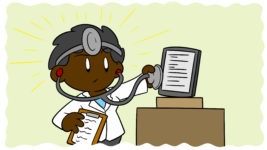I remember my very first writing critique. I was meeting with a group of women I worked with; two of them were acquaintances, the other two were complete strangers. And I was so nervous. I walked into that writer’s group feeling shaky and sweaty and afraid of being unmasked as a failure.
Can you relate? Critique, whether in a group setting or one-on-one, can be so nerve-racking! Fortunately for me, I left that group feeling encouraged, inspired, and motivated to revise my book. Many hundreds of critique sessions later, the memory of that first one has stuck with me. Giving and receiving kind, insightful, and actionable critique is one of the best tools writers can offer each other. When it goes bad, it can undermine an author’s confidence, derail their work, and make them less likely to pursue or provide help in the future. So, let’s look at some key guidelines for giving and receiving good critique.
Requesting a critique
Know who to trust for feedback
You’ve probably heard enough negative critique stories by now to know that you shouldn’t trust just anyone with your work. But in case you haven’t, take it from me: you want to be selective about who you share your work with. You want a critique partner you can trust to be professional, insightful, knowledgeable, discerning, and kind.
A good critique partner is professional, insightful, knowledgeable, discerning, and kind.Click To TweetOn the other hand, you can’t always know this about a person up front. So, if you suspect a person might be a good critique partner, give them a chance. But if it doesn’t pan out, don’t be afraid to make it a one-time deal. You can’t afford to waste your time and emotions on a partnership that’s not helpful to you.
Know what (and what not) to tell your partner up front
Let your partner know if you’re pressed for time so you’re not stressed or resentful about when they’ll return their feedback, and be sure to tell them how much you appreciate their time and effort. That little bit of consideration will go a long way to keeping the relationship on good terms.
Be clear about time when planning with a critique partner.Click To TweetI recommend not asking for a particular focus so you can receive unbiased critique from your reader. If you ask them to pay attention to a particular issue, they may miss other important aspects.
Know what to do after you receive your critique
After you review the critique, put it away. I know that’s going to be hard. Your mind will be spinning with all the ways you need to change your book based on your partner’s feedback, but I’m begging you not to do that. When you wait and let that advice sit for a bit, you can come back to it with much less emotional attachment and much more objectivity. If you still agree with it after a few days, go ahead and revise your book accordingly.
Too often, I see authors get feedback and immediately change their book based on that advice. You need to remember that advice is subjective, and you’ll have as many opinions about your book as you do readers. Some of that advice needs to affect your book, and some of it needs to be ignored, and you’re much more likely to distinguish which is which if you give yourself some time to think about it. Otherwise, it’s all too easy to find yourself in a constant cycle of fiddling with things in your book that are perfectly fine as they are.
Evaluate your critique experience
This doesn’t have to be anything formal or written, but just take stock of how you feel after the critique experience. Did it benefit you? Was this person kind, thoughtful, timely, and critical of your work in a way that gave you results, or do you feel beat down and like you have no business being a writer? Do you think you’re the best writer who ever lived and you never need to change anything because your book is so amazing?
Take a critical look at how you feel and what kind of results you achieved from this critique experience; ask whether it would be beneficial to repeat the exercise. If the answer is no, give yourself permission to move on and try another partner or a writer’s group or another approach entirely. If it was a great experience, then set a date to do it again.
Giving a critique
Know where to put your focus
Being entrusted with someone’s work can sometimes make us feel we’ve been given license to change anything and everything we don’t agree with. But, in order to give helpful feedback, you need to approach a critique with clear priorities. Here are a couple things to keep in mind:
- Unless you’ve been asked to copy edit the manuscript, keep changes to mechanics at a minimum. It will be helpful for the author to see where they’ve made a repeated error, so go ahead and point out a consistently misspelled word or a misused term or a specific usage error. But marking up every typo and missed comma is likely to obscure the more important critique at the content level.
- Recognize the difference between your subjective preferences and objective weaknesses in the author’s writing. You’re bound to come across things in the book that you would change based on your preferences; but helpful critique is more about identifying objectively weak areas of writing and suggesting how an author might fix them. For example:
Objective feedback: You’ve used an infodump here to relay backstory; a stronger approach would be to relay it over time and using a variety of techniques.
Subjective feedback: I’m not sure I like the idea of using a journal entry to share the protagonist’s backstory.
In short, understand the scope of the critique and stay within those boundaries to provide actionable feedback to help your partner revise his or her work.
Know how to give balanced criticism
Do your best to be honest, kind, and diplomatic; you know how hard it is to receive criticism about your creative work. But, on the other hand, be sure to return helpful, critical, actionable advice to your partner. If you can’t offer criticism and you only send back a glowing report, you won’t help them strengthen the writing.
Be tactful, but know that other writers need your honest feedback. Click To TweetKnow how to deliver the bad news
When it does come to pointing out weaknesses in a book, how you say it is everything. Lots of writers feel like it’s their duty to be as blunt as possible when delivering feedback, but tactful phrasing is actually more effective. Your partner is so much less likely to resist criticism if you can say it in a kind and positive way. For example:
Constructive: I think a stronger approach to relaying this backstory might be…
Destructive: This backstory is weak and boring, and it’s slowing the pacing too much.
You don’t have to walk on eggshells around your partner’s work, but keeping an eye on phrasing will go a long way to ensuring your critique is well received.
Know when your time isn’t valued
Unfortunately, sometimes you can do everything right to return an amazing critique, and… *crickets*. Your partner doesn’t say a word of thanks. Or they completely ignore your thoughtful and time-consuming feedback during their revisions. If this becomes a pattern, and you feel it’s not time well spent, consider that this might not be a positive working relationship. When that’s the case, there’s no shame in parting ways.
Working with a critique partner can be one of the most helpful ways of revising your book and improving your craft. In the best of relationships, it means getting reader insight and expert advice for free! By following these eight habits of successful critique, you can set yourself and your partner up for a successful critique relationship.
What have you learned from your past critique experiences? Tell me about a positive or negative critique that sticks out in your mind. Or, for more about getting and giving effective feedback, check out How To Run A Successful Writing Group and Your Complete Guide To Getting Useful Criticism.






13 thoughts on “How To Be (And Keep) A Highly Effective Critique Partner”
I’ve been beta-reading for a couple of years. I have about 12 manuscripts and numerous short stories under my belt. I’ve received great feedback from some of the authors, but most just say thanks and I have no idea if I was helpful or not. As a result, I’m nervous to take on a new author that I don’t know at least a little. I put a lot of time into my beta-reads and want to know where I screwed up and where I helped. I don’t charge a fee, but I’ve been offered one on a few occasions.
If you get a critique, spend some time to let the provider know how you felt about the comments.
To my shame, I read several friend’s works before I began to do my own, and when I discovered that I should have provided feedback, I was horrified! None had told me that – they had just asked me to read their books.
Now, I suppose it is my turn, and I am going to ask for a response, and maybe specific responses about the material. I was pretty embarrassed about myself. I guess I should have known
, but I did not.
Judith – it’s too bad that they weren’t more specific in letting you know what they were looking for. I have a couple of trusted betas, but I give them different things to look for. One I like her to see where the story lags or seems too rushed (as she’s great for pacing) and another is fantastic at finding plot holes, so that’s what she searches for. There’s always a little back and forth after they’re done.
Hi Judith,
Thanks for sharing your experience. It’s so disappointing to have a negative critique session, but the positive feedback is so affirming!
Paige
A thousand times yes!! I have one CP and I always follow up her critiques with comments and an email to say thanks.
I also have beta-read several novels. If I don’t hear from them after a week or so, I send them a quick, “Hey, just checking you got back my comments and such. Hope you enjoyed the silly ones and found the others helpful.” Just like I would hate to ignore all the hard work a beta has done for me, I refuse to do the same. A quick return on a email is a great way of establishing a bond.
Hi David,
That’s an excellent point. It’s so important for authors to acknowledge a partner’s work on a critique. It’s a small courtesy that goes a long way to maintaining a positive working relationship.
Paige
I’m finally in the editing phase of my first novel (Historic) As I learn my way around the critique meetings I’ve been attending for the past 18 months. I began this as a first-time novelist, no knowledge of anything. I had words.
I know that two of our members came from a personally negative place, and although he was often correct, he was destructive and insulting along the way- he thought he was being helpful, and that he was doing it for the common good. He himself could not take criticism.
On the other hand, two or three of our members were specific, and especially helpful asking structural questions, the area of my greatest weakness. They spoke to unfinished thoughts, unclear language, date and time errors, and poorly handled attempts at elegant language, or humor, or plotting.
Both of those types of partners have shaped my work, and although the one caused me to want to quit writing, the others led my back into where I could learn.
Thanks very much for good blogging. I always need to learn and have a lot to catch up on, having started late.
I have read several manuscripts for peers and enjoy the challenge of giving honest, but encouraging feedback. At the moment I’m reading one that has all the makings of a good novel, but the writer (after three years) can’t seem to digest what it will take it to transform it from bland to intriguing. During a pivotal argument have her throw the wine glass against the wall, get emotional! It’s a novel, shit needs to happen. If your characters aren’t interesting, they don’t belong in the story.
An author wrote a story about a praying mantis: he saw one, then found another one on his clothing and hurriedly brushed it off, then went into the past and told a story of a mantis he had seen doing something very destructive. I said that the sequence should be changed so that by the time the mantis is found on the clothing, the reader already knows what bad-ass bugs they are and can share the horror and panic that the author felt on finding a mantis on his clothing–thus experiencing the event the same way the author did. And since our culture really likes threes, he should first see a mantis some distance away–this sends him down memory lane to the mantis fight scene–then he sees another one nearby and gets up to move away from it, and finally finds the third one on his clothing: “Oh my God, I’ve got one on me!”
Thanks, Paige. Solid advice.
“Too often, I see authors get feedback and immediately change their book based on that advice. You need to remember that advice is subjective, and you’ll have as many opinions about your book as you do readers.”
If people don’t remember anything except the above point after leaving this post, they’ll have a useful tool going forward.
I enjoy online critique sites. I’ve grown as a writer with every critique I’ve given or received.
Sometimes, words or concepts that seem obvious to me raise questions from people in Europe, for example. As a writer, I have to decide whether an edit will solve the problem without stealing the soul of my narrative.
Good point, Kathy!
Hello! What if you have a critique partner who doesn’t understand you or your instructions? To elaborate, I am critiquing their story, and they are critiquing mine. However, I’ve noticed that they stopped critiquing my work when I said they were done with the first act of my manuscript. I constantly told them to story wasn’t done, and they said they understood, yet they still don’t read. (Mind you, they haven’t read for months even though they are a fast reader and got through the first Act within a week or two). Of course life gets busy, but whenever I am critiquing their story in a google doc, I see them join in, commenting on my comments. It’s frustrating. Also, when I give them feedback, it’s like they don’t understand it. For example, I’ll put a question mark by a word in their work and say it sounds off. What do they do? They put a question mark by that word. I’m constantly in the dark with the person, especially since they don’t respond to me for a while. I literally have to hunt them down to get a message across. The only reason I haven’t dropped them is because they offer decent feedback. So in conclusion, what would be the right approach to this critique partner?
Also, how rude of me. Your article was very helpful. I found out I am a *clears throat* little harsh critiquer. But people say I’m very detailed and helpful. 🙂